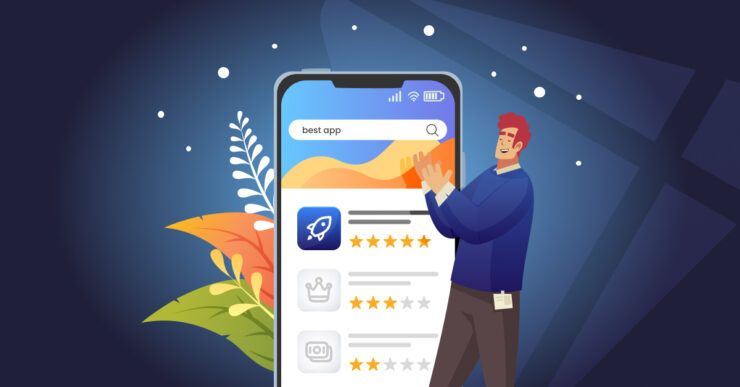
We are going to talk about the ways to get into the index for keywords on Google Play. Read till the end to find out the methods to make your application indexed.
When we are talking about the indexation process on Google Play, we understand that the key to success is App Store optimization when you analyze and choose the keywords and decide which ones should be added to the app text metadata (app title or full description). But if you watched our videos about 8 Essential Steps for Promoting Your Android App or if you worked with this Store on your own, you could notice that working with Google Play may be a challenging task.
First of all, when we are talking about the indexation on Google Play, it is important to mention that for their algorithm, it is important to see that the application has good conversion, install rate, user engagement, app activity, and so on. Secondly, it is important to mention that the indexation process on Google Play is not as fast as on the App Store, for example, where it may take several days. On Google Play, the indexation process may take several weeks and several iterations for the metadata to be updated to get into the index for the keywords. Finally, it is important to remember that when you work with Google Play, there are some more ways to get into the index for the keywords, and that’s what we are talking about today.
- Why does your application need the CPI Campaign?
- Advantages of CPI campaign
- Overview of CPI Campaign
- СPI Campaign setup features
Why does your application need the CPI Campaign?
If you worked with our platform previously, you know for sure that Keyapp is not only about keyword promotion. We are doing our best to provide as many services and tools as possible to promote keywords for our clients. For example, you may use free App Store optimization tools to check the application for keywords, find some new keywords for your app, and check the app’s positions for search requests in different countries. At the same time, we work with app reputation because we understand how the Google Play algorithm works and we know that for Google Play, it is important to see a high rating and a lot of positive reviews to get the application into the index for the search request as well as to keep the app ranked for the particular keywords. But at our service, there is one more option to use, and this option is called the CPI campaign.
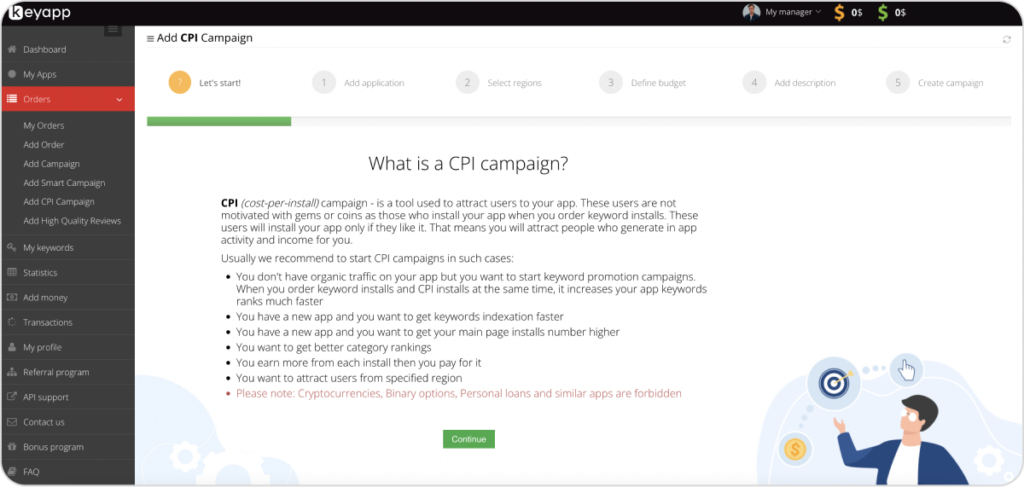
Actually, in previous videos, we have already discussed some advantages and ways to set up a CPI campaign at our service. Let’s repeat that when we are talking about mobile application traffic, we remember that it is divided into paid traffic and organic traffic, and the app gets organic traffic after some app store optimization efforts are done. For example, we know that search traffic is organic, and App Store optimization influences the amount of search traffic the application may get. But when we are talking about paid traffic, we know that this is the traffic, for which we apply some marketing efforts and for which we spend some funds to attract particular users. On our platform, you can work not only with keyword installs but also with paid traffic as a CPI campaign.
Paid traffic may be attracted from different sources from any AD Network: Facebook ads, Google ads and so on. But to be honest it is known that not all the developers and not all the app marketers have the possibility to create the account on Google ads for example, while adding paid traffic is extremely important in the indexation process especially if the application is new.
Advantages of CPI campaign
If you are talking about some advantages of CPI campaign, of course this type of campaign may bring some users to your application and you do not pay for any clicks, you do not pay for impressions. You pay only for the installs so the ads with your application are shown on different resources and if users like the app they just click and download. In such a way you get in-app activity.
Also you may use CPI campaign in the cases one you would like to increase the number of downloads on listing page. For example let’s imagine that for now your application has 100 plus downloads reflected on the listing page and you would like to get 1000 plus so in such a case you need to use CPI campaigns. So users see this number when they enter the app of your application. At the same time CPI campaign may help to work with category ranking. Category rankings are influenced by some app metrics as well but the total number of downloads influence as well.
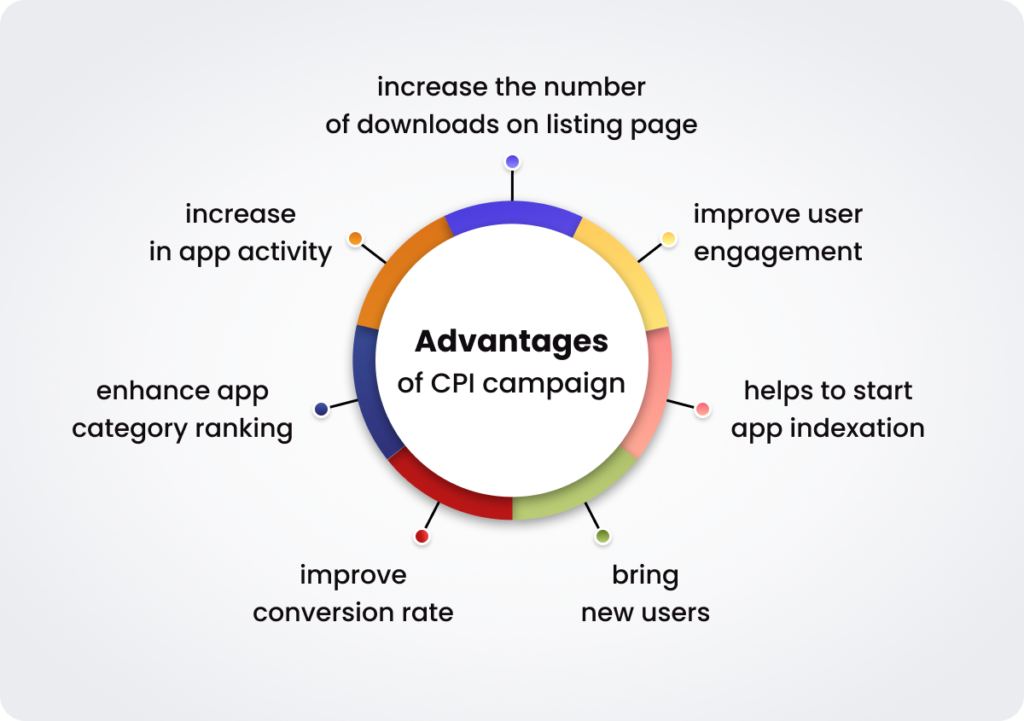
Finally CPI campaign helps to work with indexation. You remember all the process: so you optimize an app, add text metadata (app title, shirt and long description) and after this Google algorithm checks this text for the keywords and associates this search request with your application so your app becomes more visible in the search list. But you know that sometimes App Store optimization doesn’t work the way we would like it to work — like new keywords do not appear in the search, the application is not visible or this process takes a lot of time. Of course if you optimize an app one week past and you say that no keywords are indexed that’s fine for Google Play — you may wait like one week more because it is the average period of time which Google uses to check the application and generate some indexed keywords. But if you see that several weeks have already passed and still there are no indexed keywords for your application it’s already time to proceed with some actions. These actions may be different and the first thing you would like to do – the update of text metadata. Change the keywords and title in short and full description so in such a way you just make Google to start the checking process from the beginning.
But there is one more important thing which we already discussed is that for Google Play it is extremely needed to see the app metrics to start the indexation process so when Google algorithm decides to put the app in the search list for the search request or not they check the metrics as well. So the application should have a good conversion rate, at least it should have active users who generate in-app activity, user engagement, and it has daily and monthly active users. How can we got this in-app activity to show Google that the application is used and deserves to be indexed? Of course, with some paid traffic. If you do not have an account on any AD Network you can easily use CPI campaigns at Keyapp.
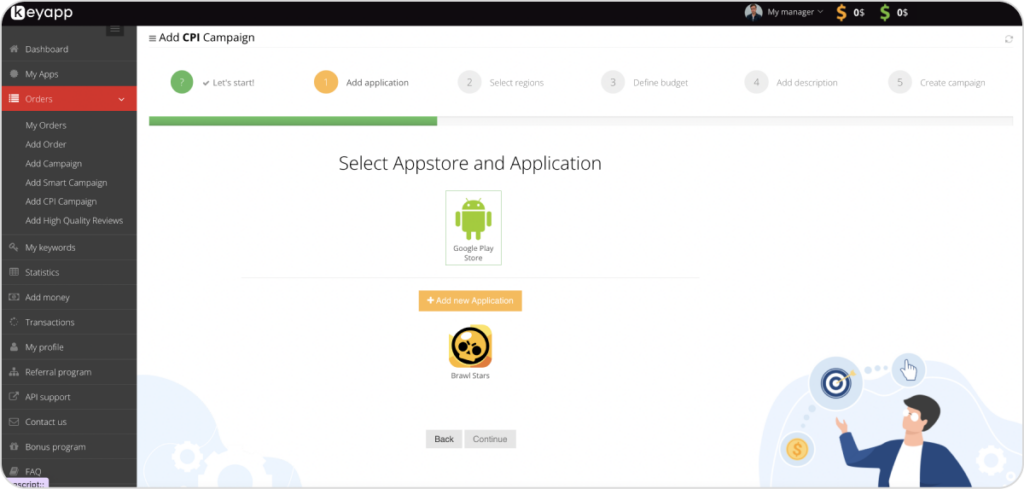
Everything you need to do is just add the application and go to “Add CPI Campaign”. So you do not need to create additional accounts on Facebook ads, Google ads, or any other AD Network. Everything you need is just an access to the Keyapp platform.
Overview of CPI Campaign
You may check our previous videos where we explained how to set up a CPI campaign, how to choose the application, and how to choose regions. In general, CPI campaigns are region targeted, so you may choose which countries you would like your application to be shown on different resources.
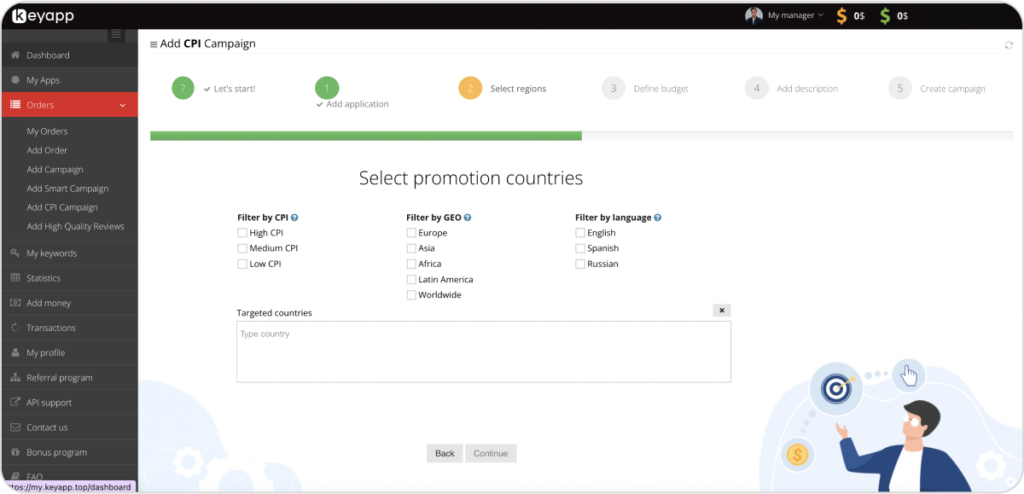
And here you may ask, How does this influence the indexation process? We remember about the app metrics, and we remember that for Google, they are important in all cases, both in indexation and in position keeping, like when you achieve a particular rank for particular keywords. So let’s imagine that you would like to get into the index for the keywords in the United States, in Canada, or in any other Tier 1 country. And what can you do? Of course, you just set up a CPI campaign. But here you may think that it is needed to set the CPI campaign for the US or Canada as well, but the cost per install in this country is high because, actually, both the United States and Canada are the regions with the highest cost per install, like Australia or Europe mostly. And you may think that it is needed to start the campaign for the same region,but the advantage is that you may set the campaign for the regions with low cost per install and in such a way show Google that the application is used, has in-app activity, and has user engagement, and Google will start to generate indexed keywords for other countries as well. So you may like to start CPI campaigns for Albania, Brazil, American Samoa, and so on, and in such a way that when users see the ads with your application, click, and download the app, the new indexed keywords will be generated for the United States as well.
The advantage is that you may set the campaign for the regions with low cost per install and in such a way show Google that the application is used, has in-app activity, and has user engagement, and Google will start to generate indexed keywords for other countries as well.
First, we understand that if you would like to get into the index in the United States, it would be easier to use CPI campaigns in the same country. But if you do not want to spend high budgets, if you do not want to set like one dollar as a cost per install, you can easily choose a low CPI campaign country. While the ads are shown and some users have already downloaded the application, it is necessary to follow all the changes in the positions of your application and all the changes in the indexation process. Of course, it may sound so illogical because, like how the application may be indexed in the United States if the CPI campaign is run in another country, the way Google’s algorithm works, and the methods you may test as an app developer to get into the index for the search request.
CPI Campaign setup features
Working with CPI campaigns at Keyapp has these advantages:
- you can set the daily budget
- you can set the target cost per install for any region
- do not need to create any images
Of course, we remember that both the daily budget and target cost per install influence a lot the success of your CPI campaign, so the higher the daily budget, the higher the cost per install, and the more chances the application has to be downloaded by the users on different resources. But if you set, for example, the cost per install at 20 cents, it doesn’t mean that all the installs will cost 20 cents. It means that, actually, the maximum you are willing to pay for one install may be lower, even 10 cents or 5 cents. The same thing is true for the daily budget. If you set a daily budget of $50, it doesn’t mean that all 50 dollars will be spent within the day. It means the maximum you’re ready to spend for one day of your campaign. Remember that the daily budget influences the way your ads are shown. So the higher it is, the more ads may be shown and more users may see your application on the internet.
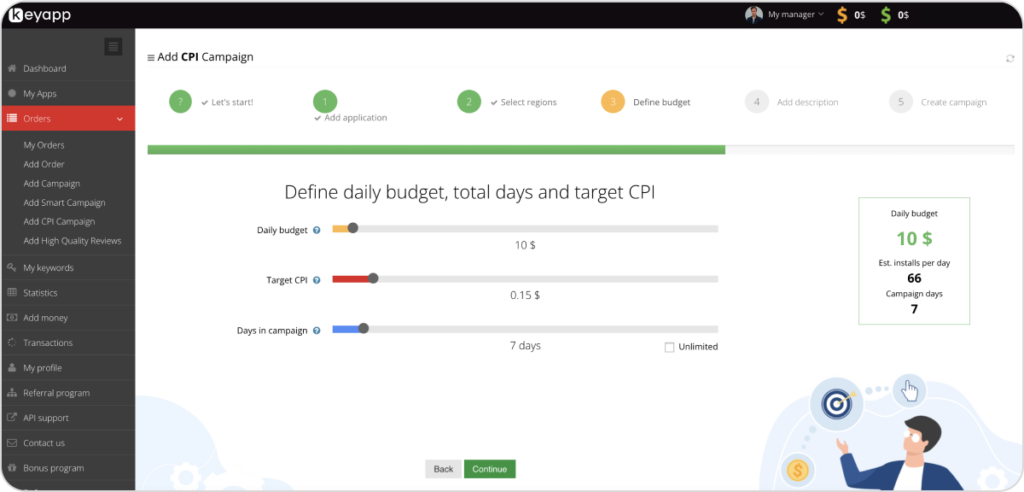
At the same time, you do not need to create any images or videos. Everything you need to do is create the descriptions and headlines for your ads. You can generate them on a platform or you can add them on your own, so you do not need to add any pictures, create them. Everything is pretty simple, and you can set up a CPI campaign within several seconds.
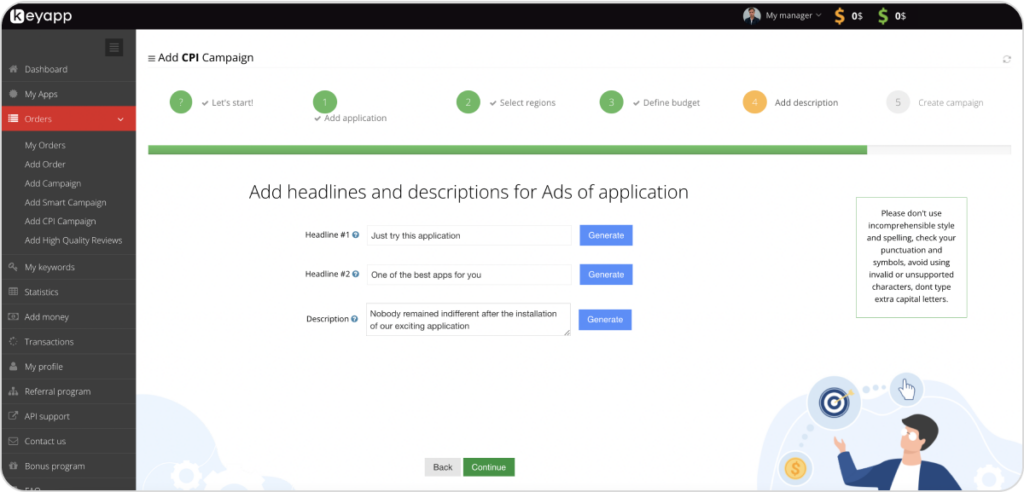
Also, you can run CPI and keyword campaigns simultaneously for Google Play apps. This marketing strategy will give your application the maximum result in terms of increasing your user base and app revenue. In this article, we explored the best practices for app marketing, focusing on how to effectively promote your app using both CPI and keyword installs.
SUM UP
Let’s repeat that for Google Play, it is extremely important to say that the application has in-app activity, user engagement, and some conversion rate. The CPI campaign network available at Keyapp will give you all these advantages because if one user sees the ad on the internet, they already know if they like it or not. They may click on it, go to Google Play, see the app page, and decide if they would like to download it or not. In such a way, your application gets the exact same number of impressions and installs, and Google pays a lot of attention to this and decides to put the application on the index.
You do not need to create any additional accounts, and you do not need to provide any additional app links, so you just need to put the application on the Keyapp platform, go to CPI campaigns, and create the campaign. And this campaign will give you advantages such as an increase in app activity and number of downloads (incl. app listing page), user engagement, and app indexation. If you see that your app is not indexed, for example, within one and a half to two weeks after the text metadata update, it is already needed to proceed with some paid traffic.
That is the way Google works, and that is the way we as app developers and app marketers may help Google understand that it is needed to put the app in the search. Do not hesitate to test different strategies; do not hesitate to set different daily budgets and different costs per install.
You may check out our previous video about CPI campaigns, where we explain how to determine which cost per install to set and what daily budget to set. Anyway, if you would like to get indexation in Tier 1 countries, start with a CPI campaign in low CPI countries and just follow all the changes with keyword positions. All these changes may be followed on our platform. All you need to do to follow the positions is just add the keywords to my keywords section, which is basically all the keywords you have in your keyword research, or you may just add several of them, and then you can use the suggest button to get more search requests. At the same time, you can also use Smart Campaign while the CPI campaign is running, and this will help you check for which keywords your application is already indexed in the particular countries.
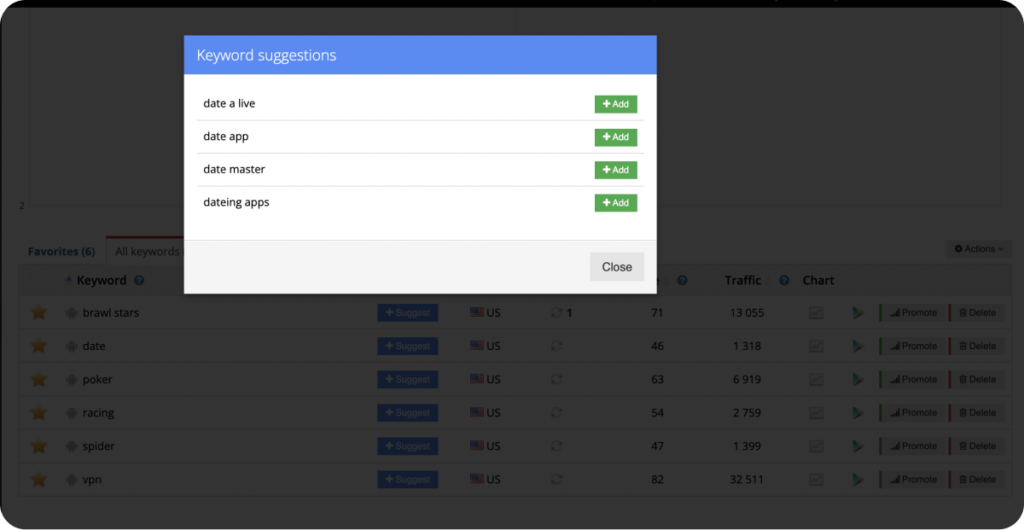
This paid traffic you get from a CPI campaign can help you work with Organic traffic because it can boost the process of indexation — the app will be visible for different keywords in different countries.
If you have some more questions about the different types of campaigns and traffic we have, as well as about the different types of App Store optimization tools, do not forget that you can use them completely for free to find and analyze the keywords. Our Support Team will be happy to assist and tell all the secrets that can help your app get into the index for the keywords and occupy top positions for the search request.

